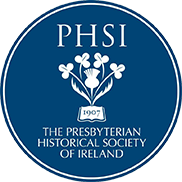1st July 2016
The Men
This day is the 100th anniversary of the start of the Battle of the Somme which has come to symbolise the horrors of the First World War and the ultimate sacrifice made by so many for the freedom we enjoy today. The Battle of the Somme lasted from 1 July to 18 November 1916 but it was the heroic action of the 36th Ulster Division on 1st and 2nd July who suffered 5,000 casualties of whom over 2000 died that has long been memorialised. The names of 75 per cent of the Division’s fatalities have no known graves and are recorded on the Thiepval Memorial and the Ulster Memorial Tower in Northern France. Read more: an article in the News Letter. Of the nine Victoria Crosses awarded for service on the first 2 days of the Battle, three went to the Ulster Division, one of them being Private William McFadzean, a Presbyterian.
Millions died in the course of the war which has rightly been described as one of the most deadliest conflicts in history. At the outbreak of the First World War in August 1914 thousands of men from Ulster volunteered to defend their nation, not least many Ulster Presbyterians from every part of the country. One has only to open the pages of the Presbyterian Roll of Honour produced by the Presbyterian Historical Society of Ireland just a few years after the war to appreciate the sheer numbers of Presbyterians who served, many of whom were injured or lost their lives.
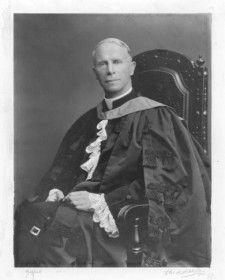
The Roll contains the names of some 24,000 names but we know that there may be another 2,000 names that were not recorded. If you know of names that are not listed in a congregation or congregations that are not included please let us know so that these names can be added. The Roll included some 41 Presbyterian ministers who served as commissioned army chaplains or who served with the YMCA while others even enlisted within the ranks of the army. Even one of our Presbyterian missionaries, the Rev Frederick O’Neill, a Presbyterian missionary in China served in France with the Chinese Labour Corps composed of 96,000 people who assisted the Allied Forces in France and Belgium from 1917 to 1919. For his work with the Chinese Labour Force, the Rev O’Neill was awarded the Order of the Striped Tiger by the Chinese government. This medal is now held by the Presbyterian Historical Society of Ireland. One Presbyterian missionary, Dr Neil Gavin, lost his life while serving with the Royal Army Medical Corps at the Front.
The Presbyterian Chaplains
Presbyterian chaplains who served during the war provided vital spiritual support to the troops – preaching, administering the sacraments, pastoring and conducting burials. They too were often wounded or killed. The first Presbyterian chaplain to die was from Ulster – the Rev Alexander Stuart who was killed in France in October 1917 just two weeks after his arrival (see the Presbyterian Historical Society of Ireland website for more information about the Rev Stuart). Other Presbyterian chaplains who died during the war included the Rev William Wilson of Coleraine who, while serving with the YMCA, died in a motor accident in France. Recognition of the chaplains’ bravery and courage is reflected in the number of honours bestowed on them. These included thee Rev Hugh Craig Meeke, Ballylinney congregation, who was awarded the DSO and 5 others received the Military Cross – the Rev Andrew Gibson, Hill Street Lurgan congregation, the Rev John Edmond Hamilton, Helen’s Bay congregation, the Rev William Holmes Hutchison, Cullybackey congregation, the Rev James Gilbert Paton of Malone Belfast congregation, and the Rev John Jackson Wright, Ballyshannon congregation.
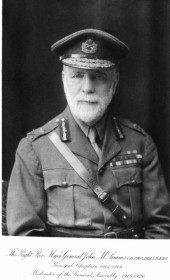
Leadership of the Chaplaincy Department was provided by another Ulsterman, the Rev Dr John M Simms who was appointed Principal Chaplain of the British Expeditionary Force. He and his secretary reorganised the Chaplaincy Department and thereby placing the spiritual welfare of soldiers on a more satisfactory footing. Described later on as ‘A man of rare sagacity and wide experience who for over 30 years has shared the fortunes of our Army in many a campaign ...’ Dr Simms was made a Companion of the Order of the Bath and was the first chaplain to be awarded the Companion of the Order of St Michael and St George (CMG).
Three of the First World War chaplains later became Moderators of the General Assembly of the Presbyterian church in Ireland – the Rev Dr Simms, the Rev Dr Gilbert Paton and the Rev Dr Andrew Gibson.
The Support for the War from the Presbyterian Church in Ireland
The Presbyterian Church in Ireland supported the war and did much to encourage recruitment into the British army. While recruitment was successful in urban areas the Committee for Social Services of the church deplored the fact that the same support was not realised in rural areas.
The Aftermath of the War
The deaths of so many fathers often left families destitute and as a result there was an marked increase in the number of applications to the Presbyterian Orphan Society for assistance. This is described in more detail in ‘Putting Children First - the Story of 100 Years of the Orphan Society’, published by the Presbyterian Historical Society of Ireland (2016).
A lasting memorial to those who died was marked by the decision of the Presbyterian Church in Ireland to erect the Presbyterian War Memorial Hostel at the corner of Howard Street and Brunswick Street which was opened in 1926 to provide accommodation for young people at work or at university or college.
M'Crea Magee College and the Great War
This cutting from the Belfast Telegraph shows the bronze tablet War Memorial erected in the Examination Hall in M’Crea College in memory of the students who fell in the Great War. It was unveiled by the Rev Dr J M Simms, Moderator of the General Assembly who himself had been Principal Chaplain of the British Expeditionary Force during the 1st World War.
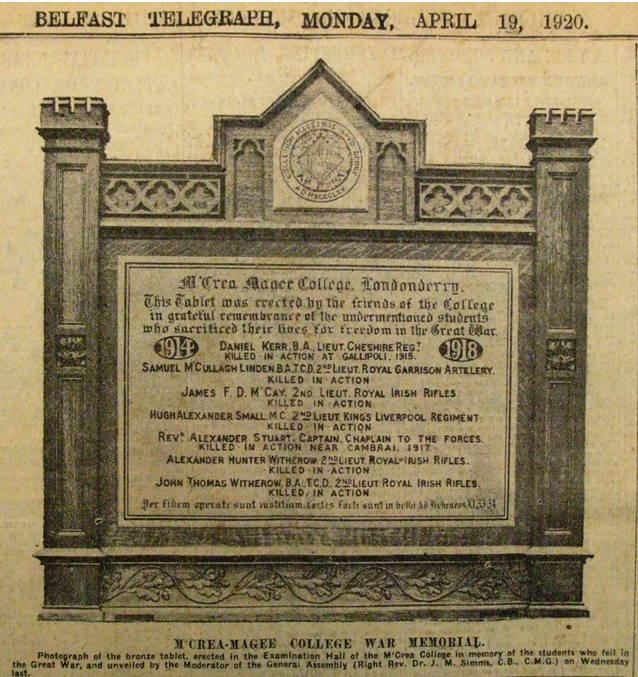
- Lieutenant Daniel Kerr (14th Battalion, Cheshire Regiment, attached to 2nd Battalion South Wales Borderers), was Killed in Action on 6th July 1915 aged 23, and is commemorated on the Helles Memorial, Gallipoli, Turkey. Daniel was born on 8 January 1892 to Samuel Joseph Kerr and Margaret Morrison who farmed land at Craignamaddy near Bushmills. His father died on 7 July 1895. Daniel was a student at Queen's University in Belfast and after graduating with a BA degree he enrolled as a student for the Presbyterian ministry and was a member of Croaghmore Presbyterian Church.
- Second Lieutenant Samuel McCullagh Linden (90th Heavy Artillery, Royal Garrison Artillery) was Killed in Action at Vlamertinghe on 31st July 1917, aged 25, and is commemorated on the Menin Gate Memorial in Ypres. Samuel McCullagh Linden was born on 30th September 1891 at Barronstown in County Louth to Robert Linden, a police constable, and Eliza Baird and the family was living at Finglas in Dublin in 1901. In 1911, the family was living at Adelaide Road in Dublin and Robert and Elizabeth were recorded as being caretakers, possibly of Adelaide Road Presbyterian Church. In 1911, Samuel was a "Student in Arts" and he studied theology at Trinity College Dublin. He was a Probationer in the Presbyterian Ministry when he married Florence Elizabeth Neill on 24th April 1916 at Great James Street Presbyterian Church in Londonderry and she was living at 41 Clarendon Street when her husband died.
- Lieutenant James Frederick Daniel McCay (15th Battalion, Royal Irish Rifles) was Killed in Action on 27th March 1918, aged 26, and is commemorated on the Pozieres Memorial in France. James was born on born 11th January 1892 at Goland to the Reverend James McCay, Minister of First Castlederg Presbyterian Church, and Jeanie Gailey and is commemorated on the Roll of Honour for First Castlederg Presbyterian Church and on the Castlederg War Memorial.
- Second Lieutenant Hugh Alexander Small (20th Battalion, King's Liverpool Regiment) was Killed in Action on 10th July 1916, aged 25, and is commemorated on the Thiepval Memorial in France. Hugh was born on 28th March 1891 to Alexander Small and Meta Kennedy Milliken who farmed land at Keady. Hugh Small is commemorated on the war memorial in Second Keady Presbyterian Church.
- Chaplain (4th Class) Alexander Stuart (Army Chaplains Department, attached to 12th Battalion Royal Irish Rifles) was killed in action on 24th October 1917, aged 37, and is buried in Ruyaulcourt Military Cemetery in France. Before being commissioned as a Chaplain, Reverend Stuart had served in France with Young Mens Christian Association in 1916. Alexander Stuart was born on 14th August 1880 at Maymacullen near Tandragee to the Reverend Joseph Crawford Stuart and Sarah Jane Stuart (nee Fleming). The family home was at 54 Brookvale Avenue in Belfast when the Reverend Joseph Stuart died on 30th November 1893 and when Sarah Stuart died on 9th November 1918. Alexander Stuart is locally commemorated on a family memorial in the graveyard at Culnady Presbyterian Church Graveyard where his father had been the minister, on the memorial tablet in Bessbrook Presbyterian Church, and on Bessbrook War Memorial.
- Second Lieutenant Alexander Hunter Witherow (8th Battalion, Royal Irish Rifles) Died of Wounds on 3rd July 1916, aged 21, and is buried in Puchevillers British Cemetery in France. Alexander Hunter Witherow was born on 21st October 1894 to Alexander Witherow, a farmer, and Margaret Quigley of Kincull House, Straidarran, County Londonderry. He is locally commemorated on the war memorial in Banagher Presbyterian Church.
- Second Lieutenant John Thomas Witherow (8th Battalion, Royal Irish Rifles), brother of Second Lieutenant Alexander Hunter Witherow died of wounds on 5 August 1917, aged 25, and is buried in Brandhoek New Military Cemetery in Belgium. John Thomas Witherow was born on 7th February 1893 to Alexander Witherow, a farmer, and Margaret Quigley of Kincull House, Straidarran, County Londonderry. He is commemorated locally on the war memorial in Banagher Presbyterian Church.
Two VCs
Read about two Presbyterians who were awarded the Victoria Cross after making the Ultimate Sacrifice - Robert Morrow VC and William Frederick McFadzean VC.
Thomas McCullough
The Dream of new life in Canada ended on WWI battlefield for Thomas McCullough, from Mountnorris, Co Armagh.
A tribute to one of many that we remember at this Remembrance season 2020.
Having emigrated from Co Armagh to Canada in 1913 just two days after his 18th birthday, Thomas McCullough was filled with optimism about starting a new life across the Atlantic.
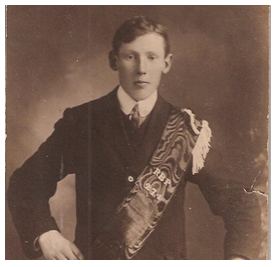 Thomas McCullough
Thomas McCullough
His tragic death three years later during the conflict of World War One highlights the selfless sacrifice made by thousands of young men like Thomas.
Born on March 20 1895, the second of 6 children of Thomas James and Susan McCullough from Tullyallen House, Mountnorris in Co Armagh. His early life was spent at Tullyallen House, attending Derrycughan Primary School (now part of Markethill Primary School) and also in the townland of Ballygorman where his grandmother lived. It would seem that Thomas had worked as a labourer. Thomas was very active in the community -he attended Sunday School and Church at Mountnorris and was a member of Mountnorris Orange Lodge and Royal Black Preceptory (RBP 274).
Like many men and women who left Ireland for a new life overseas Thomas McCullough headed for Montreal in March 1913. Leaving behind family and home he made his way to the port of Londonderry to take a ship to a new life. At the port of Londonderry Thomas purchased a third class ticket – number 4812 – on a ship called the SS Scotian bound for Halifax in Canada and Boston in America. From the passenger list we know that it was his desire to make Montreal, Quebec, his permanent residence. Thomas sailed from Londonderry on March 22, 1913 and nine days later on March 31, 1913, sent a message home to Mountnorris that he had safely arrived in Halifax, Canada.
The following year on Tuesday, August 4, 1914 life for Britain and its Empire was to change with the start of World War One. Canada was to fully support the war effort with thousands of young men answering the call to join the army when it came. Thomas McCullough responded to that call on October 23, 1914, presenting himself at a recruiting office in Montreal. He was assigned to the 24th Battalion Victoria Rifles of Canada – an Infantry Regiment that was a part of the Canadian Expeditionary Force. Following his enlistment extensive training began for Thomas and his colleagues. On the May 10, 1915 Thomas and the 24th Battalion Victoria Rifles of Canada boarded a ship called the SS Cameronia and sailed for England to train in the Sandling Camp.
In September 16 1915 he and his regiment sailed to France and disembarked at Boulogne. Thomas was to experience the most horrific events on a scale never seen in the world before. He was sent to the trenches and by October 27, 1915 he was suffering having been diagnosed with trench foot – a medical condition caused by prolonged exposure of the feet to damp, unsanitary, and cold conditions.
On June 16, 1916 Thomas was wounded and the following day the 17th June he experienced shell concussion from an explosion. Amazingly by June 28, 1916 Thomas was back in the trenches fighting alongside his comrades. October 10, 1916 was a fateful day for Thomas as during the Battle of the Ancre Heights he received a femur fracture in the battlefield. Sadly, fighting wounds and septicaemia, Lance Corporal Thomas McCullough was to lose his earthly life on November 12, 1916 at 9.30pm. His father and brother travelled to Kent and brought his remains back home. He was buried on November 18, 1916, at Mountnorris Presbyterian Church with full military honours. The Commonwealth War Graves Commission later erected a headstone to mark his burial place. His name appears in the Presbyterian Roll of Honour with 24 others from Mountnorris Presbyterian Church who served during the First World War and with 4 others who were also killed in action. Thomas was one of 7 men who belonged to that congregation and who served with the Colonial Forces.
Thomas McCullagh is just one of thousands who paid the supreme sacrifice in defence of democracy and the freedoms we enjoy today.
His story has been brought to light by the Rev Nigel Reid, the minister of Mountnorris and Tullyallen Presbyterian Churches to whom we are most grateful for his permission to publish this edited version.
Sources for further reading and information
The Presbyterian Church in Ireland Roll of Honour 1914-19 published by the Presbyterian Historical Society of Ireland (available on the PHSI website)
‘Sacrificial Service’ by the Rev Dr Victor Dobbin, former Chaplain General , in the Presbyterian Herald, November 2014
‘Chaplaincy in the First World War’ by the Rev Dr Victor Dobbin, former Chaplain General, in the Bulletin of the Presbyterian Historical Society of Ireland
'Memorial to Chaplains in the Great War' (2020) published by the Presbyterian Church in Ireland's Council for Mission Ireland and the Presbyterian Historical Society of Ireland (see on-line book shop of the Presbyterian Historical Society of Ireland for sales).
‘In this Sign Conquer – Chaplains of the Presbyterian Church in Ireland in the Great War’ produced by the Presbyterian Church in Ireland
‘For Valour – Ulster VCs of the Great War’, Ulster- Scots Community Network
‘Irish Winners of the Victoria Cross’ by Richard Doherty and Richard Truesdale (Dublin 200)
‘Chinese Labour Corps’ by Mark O’Neill (2014)
Soldiers’ wills – see soldierswills.nationalarchives.ie – for wills of many soldiers who fought in the First World War.
See the Presbyterian Roll of Honour web page for more information.
